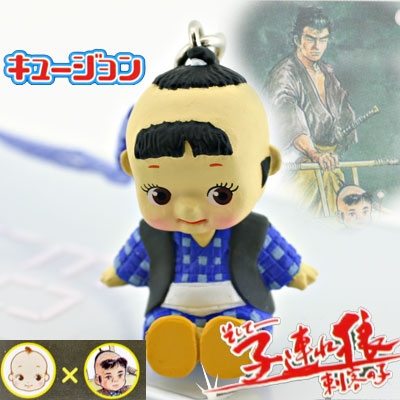A little while back I read the first volume of Koike and Kamimura’s Lady Snowblood and was impressed with the craft but repulsed by the content. Basically it seemed to me that the work contrasted a nostalgic code of honor with a decadent modernity, and used that contrast as an excuse for vicious and racialized murder, rape, and the general fetishization of force and death. It made me understand more clearly than I had done before what strands of thought in Japan might have allowed that nation to reach an agreement with Germany during World War II.
A commentor encouraged me to try the Lady Snowblood movie from the early 1970s, suggesting that it avoided many of the problems of the book. So I’ve finally seen it…and the commenter was correct to some extent. Lady Snowblood doesn’t force a man to rape an innocent girl at knife point. The racial subtext — the positing of decadent Western modernity as a crime itself worthy of vengeance — is sort of, kind of still present, but it ends up way down in the mix.
But nevertheless…even for somebody like me who finds a lot to like in rape revenge films like “I Spit on Your Grave,” this movie is awfully hard to get behind — at least for a pansy liberal Westerner like me. The plot is built around the idea not of individual revenge, but of generational honor killing — the protagonist Yuki’s father was killed by a gang in front of her mother’s eyes; they then raped the mother. Mother then set out to revenge herself, but ended up in prison for life. So sheset about getting herself pregnant by sleeping with anyone she could, so as to have a child who would carry out her vengeance. Mom dies in childbirth, and Yuki ends up with a friend of Mom’s and a foster dad. Step-dad eagerly takes up the task of preparing the child for vengeance, explaining to her that she’s an inhuman monster devoted to killing and sets up a rigorous training program from the time she’s like 6 or 8 or something, putting her in barrels and rolling her down hills and beating her with sticks. So eventually Yuki grows up to be an inhuman killing machine just like her daddy and mommy wanted and we get to watch her chop a bunch of bad folks up. Whoo hoo.
The thing that really stuck in my craw here wasn’t the killing or the spurting blood, all of which is standard fare for rape revenge films and/or horror films and/or lots of movies I rather like. Instead, what disturbed me most was the treatment of Yuki by her parents (biological and foster). The idea that you would actually create a child solely and specifically to take care of your own random shit — as a parent I’m perhaps identifying overly here, but I just can’t support that. People aren’t things, or as Kant would say, people are ends, not means. Yuki always shouts “an eye for an eye” while doing her dirty work, but the actual economy of the film is one person’s death for somebody else’s unrelated life. The worst act of injustice here is not what is done to Yuki’s mom or dad — horrible as that is — but rather what is done to Yuki.
I guess you could argue that that’s the point of the movie — that is, it’s supposed to make us sympathize with Yuki and see the pointlessness of her honor and her revenge. I don’t think that’s what’s really going down, though. Nobody in the film ever even suggests to Yuki that maybe the revenge thing is not what it’s cracked up to be. Instead, everyone seems to more or less happily accept the idea that spending your life taking care of your broken mother’s unfinished business is a really good idea. Even the voice over narration gets into the act, telling us what a wonderful person Yuki really is beneath that unrelenting mask. And then there’s Yuki’s own internal monologue, in which Yuki says she actually remembers her Mom from when she was like five minutes old, and it’s those personal memories which drive her revenge.
The point ultimately seems to be that honor, and particularly family honor, is the only self you have. Your honor is your psychology, your personal motivation, your soul — that’s all there is to you. As such, the individual is, in fact a means, and the end is the family or the collective or, ultimately, the nation. And, again, that seems a fair approximation of fascism. As a mealy-mouthed liberal relativist embarrassed about his own Judeo-Christian heritage it’s hard for me to come out and say this, but — I think that’s evil, damn it.
_________________
For a more positive take on Koike and Kamimura, you can read Richard Cook on Lone Wolf and Cub here.
Update: Koike yes, but not Kamimura, as Richard explains in comments.
Update 2: Suat defends Lady Snowblood here.

